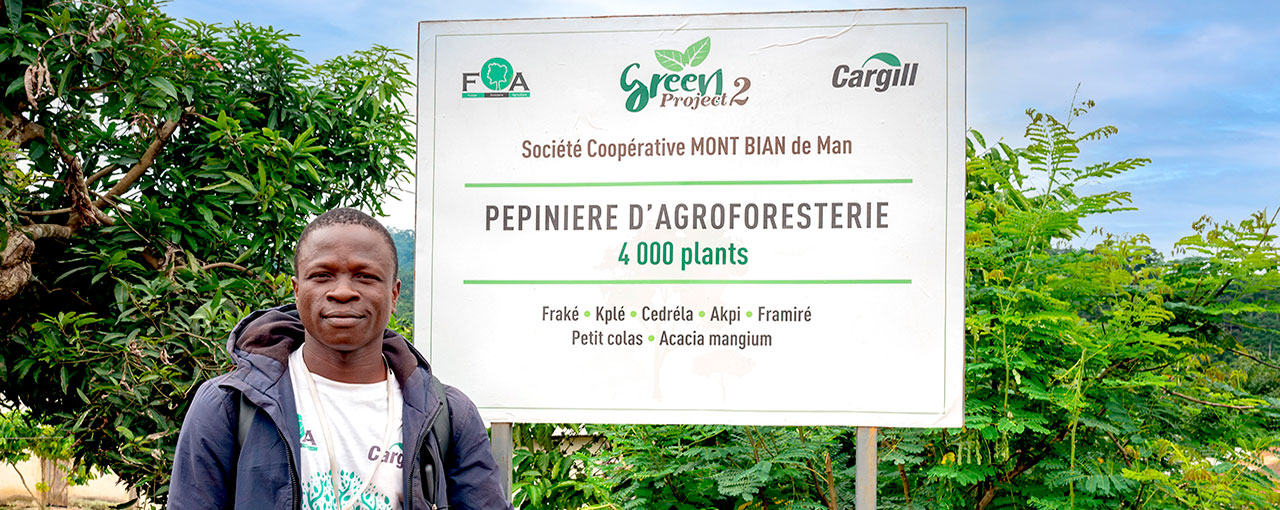Protecting Our Planet
We are committed to transforming our cocoa supply chain to be deforestation-free. We help cocoa growers adopt sustainable practices and increase on-farm tree cover. This is how we build sustainable landscapes that balance cocoa production with the conservation of forests and how we contribute to easing the impact of climate change on cocoa farmers’ livelihoods.
The context
Over the next decades, climate change is expected to threaten many regions across the world, including those where cocoa is grown. Forests play a critical role in mitigating climate change, while at the same time providing important benefits to soils, water, biodiversity and providing livelihoods for millions of farmers, as well as a secure food supply for a growing global population.
However, increasing pressure from a wide range of sources, including logging and other crop production, threaten the ecological integrity of forests. Cocoa farmers are often exposed to a variety of external variables that make it hard to secure stable livelihoods and may push them to expand further into forest areas, converting new lands in order to meet the increased demand for cocoa and meet their livelihood needs, trapping them in a vicious cycle that creates long-term problems for forests and farmers alike.
Mitigating the impacts of climate change and ending deforestation are crucial to our ability to produce enough food for everyone. The interrelated socioeconomic factors include market prices of cocoa, policies on land use and enforcement of forest protection laws. This challenge must be addressed holistically to ensure a sustainable, secure supply of cocoa for generations to come.
Our target
Zero deforestation in our direct and indirect cocoa supply chain by 2030.
Our Protect Our Planet Strategic Action Plan is helping us take concrete action to end deforestation in our supply chain and contribute to reforestation.
How are we achieving our goal?
We are addressing the connected issues affecting natural landscapes, agriculture and farmer resilience in the five countries where we directly source cocoa, as well as within our indirect supply chain. One of the hallmarks of our approach is supply chain transparency, which we enable through farmer mapping and bean traceability.
The solution used by Cargill starts with GPS devices to collect digital information about farm boundaries and create polygon maps of the farms from which we source cocoa. We use satellite technology to determine where forests remain and where forest loss has taken place. We have committed to mapping all farms in our direct supply chain. We have started with farms participating in our Cargill Cocoa Promise, of which we have mapped 70%.
Our insights in deforestation-related activities help us prioritize interventions in the areas of highest risk, for example through agroforestry. Agroforestry, a farming approach in which cocoa is grown in harmony with other trees on the same land, could provide a solution to both. With the 1 for 20 Partnership and PUR Project, Cargill has taken the industry’s first steps in modeling different agroforestry scenarios to understand how this can support farmers to make a better living while helping protect our planet.
Through the Cargill Cocoa Promise program, we are also training farmers in other Good Agricultural Practices (GAPs) to practice efficient, environmentally sound and safe farming. This ultimately allows them to increase the profitability and productivity of their existing land without encroaching into forests.
Cargill is also one of the original signatories of the industry’s Cocoa and Forests Initiative (CFI) committed to no further conversion of any forestland and ending deforestation in Ghana and Côte d’Ivoire. All signatories are committed to annual reporting on progress. These are our Annual CFI Progress Reports: 2019 , 2020 and 2021
Our work towards eliminating deforestation is rooted in our broader company commitment to transforming our agricultural supply chains to be deforestation-free, through prioritized supply chain policies and time-bound action plans as outlined in the Cargill Policy on Forests.
Results from our 2021 sustainability report:
-
70% of farmers in our direct supply chain have been mapped using GPS polygon maps and geospatial data based on satellites.
-
We assessed the carbon footprint in our operations and supply chain, verified by third-party Quantis. We now have product-based footprints.
-
We provided farmers more than 300,000 new multi-purpose shade trees for planting as part of our agroforestry efforts. More than 1.2 million trees have been provided since 2017. We also helped 5,400 farmers adopt agroforestry practices this year, with the total since 2017 reaching 21,900.
If not mentioned elsewise, all West Africa photos in relation to sustainability are by Sandrine Bénitah « @Sandrine Bénitah »

